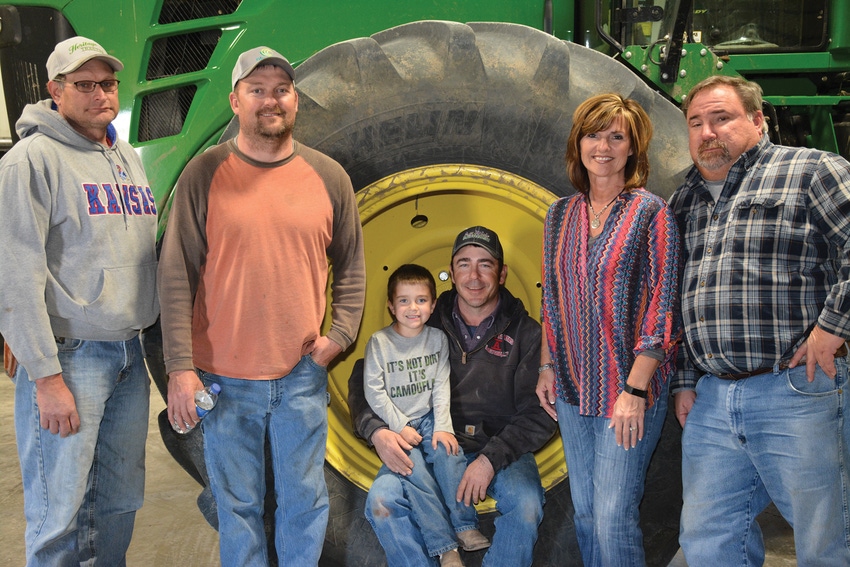
Brad Aust hires people to work on his Kansas farm who are good at problem-solving, not afraid to ask for guidance and have mastered a craft. They also listen and are willing to work. Having a farming background on the resume may help, but it is not critical.
“They have to be able to be educated and retain what they have learned,” says Brad. “It is not a huge criteria for them to have ag experience. It is more important that they have mastered a trade of some kind and be able to learn.”
Big farms like the Austs’ have year-round duties requiring year-round help. Good help is out there if farmers spend some time on training and not limit themselves to applicants with farm backgrounds.
“The last guy who came here had never been on a tractor, but he has been quick to learn,” says Brad, who explained “that guy” now drives a tractor pulling a 60-foot planter.
The Aust farm, near LaCygne, Kan., is a corn and soybean operation with beef cattle. It has six full-time employees, plus some part-time help when needed. The tenure of employees ranges from two to six years.
Ask your team for help
Where do you start when you’re looking to hire more people to work at your farm? After trying employment agencies and advertisements, Brad and his wife, Janell, now rely on guidance from their crew, who often recommend friends or acquaintances.
“We let our employees bring up names,” says Janell. “People contact them asking about openings.”
That system, she says, largely ensures the new hire is familiar with the rural environment and has an understanding of the work involved before applying.
During the interview process, the applicants are told about the farm’s long hours during planting and harvest, plus other responsibilities. Later, when they are on board and have mastered some of the required skills, discussions are held regarding responsibilities and career ambitions.
Learning to drive tractors and handle the other pieces of equipment comes fairly quickly; it is the finer aspects of farming that take time to learn. Brad says that typically requires a full crop season from planting to harvest.
“You cannot ask a person to understand what he or she is doing until they have run the combine,” he says. “Then they can see what they did in the spring affects what we are getting in the fall.”
The work involves long days during planting in the spring and harvesting in the fall, but more regular hours the rest of the year. In addition to competitive pay, the Austs offer health insurance, some flexibility on schedules during the off season and housing if needed.
“Our routine here during planting and harvest is that we will go as long as we can in a day. They will start at 6 o’clock in the morning, and if it takes going to 3 or 4 o’clock the next morning to get their goal met, they will do it and then be back in three hours to start over,” he says. “I don’t have to drive that; they all know what it is they have to do to keep the farming operation on track.”

“If farmers today are only looking for people who grew up on a farm, they are definitely not going to find enough help. You need to look more broadly,” says Melissa O’Rourke.
Think outside the box
Melissa O’Rourke, a farm and agribusiness management specialist with Iowa State University Extension, advises farmers to look “outside the box” when hiring, because finding help with farm backgrounds will be difficult.
The checklist for hiring help is similar to that used in any other business — you want people with a strong work ethic, dependable and willing to learn. O’Rourke believes that hiring good help is based more on the individual’s aptitude rather than background.
“If farmers today are only looking for people who grew up on a farm, they are definitely not going to find enough because there are fewer farms now and smaller families. You need to look more broadly,” says O’Rourke, who hears regularly from farmers complaining about the inability to find dependable help.
Once crew members are in place, what should farmers do to keep them?
While competitive pay and benefits are important, O’Rourke says farms also need to invest in educating employees and include them in decisions. Skilled employees now, particularly those from 20 to 35 years of age, want to feel like they are contributing to the operation, and that their ideas and inputs are respected and considered.
“Our research shows that a lot of the applicants fall into that age range we call ‘millennials.’ It is more important to them that they feel personal satisfaction in their employment,” she says.
That satisfaction can be fairly low cost, such as providing feedback on job performance, listening to their ideas and providing additional training that indicates the farm is investing in their knowledge.
O’Rourke suggests that farms should bring in experts from the local Extension office, cooperative, or other sources to conduct lunchtime training sessions. These sessions can focus on farm safety, chemical use, guidance on new technologies or a number of other topics. But most importantly, it shows the farm is willing to invest in training its employees.
“Training does not have to be having someone away attending school. It can be bringing somebody onto the farm,” she says. “Not only does this train employees, but it reinforces the commitment they have for that farmer. It gives them the feeling that they are part of that farm.”
At the Aust farm, the full-time employees have a regular say in the farm’s operation, which may include decisions on days of operation and time off for co-workers. When it is time to hire more help, the crew is consulted.
“That is usually the first place I go,” says Brad of hiring decisions. “Sometimes the crew will say no, because they don’t want to find something for the new guy to do when we are not that busy. There are times you need to get input from them about what they want.”
Technology is a plus
While a farm background is not a necessity for hiring, the ability to master technology is. Employees with computer and smartphone skills are an asset when using modern farm equipment with leading-edge technology.
“These younger guys thrive on that technology. It makes it easier to retain a great crew because it is a learning challenge for them. It keeps them involved,” says Brad. The days are gone, he says, when farmers would find someone on the street corner, bring them to the farm, “put them on a disk and tell them to turn the field black.”
“These later generations are more technology-driven, and agriculture is an industry that can keep them engaged in leading-edge technologies.”
About the Author(s)
You May Also Like




